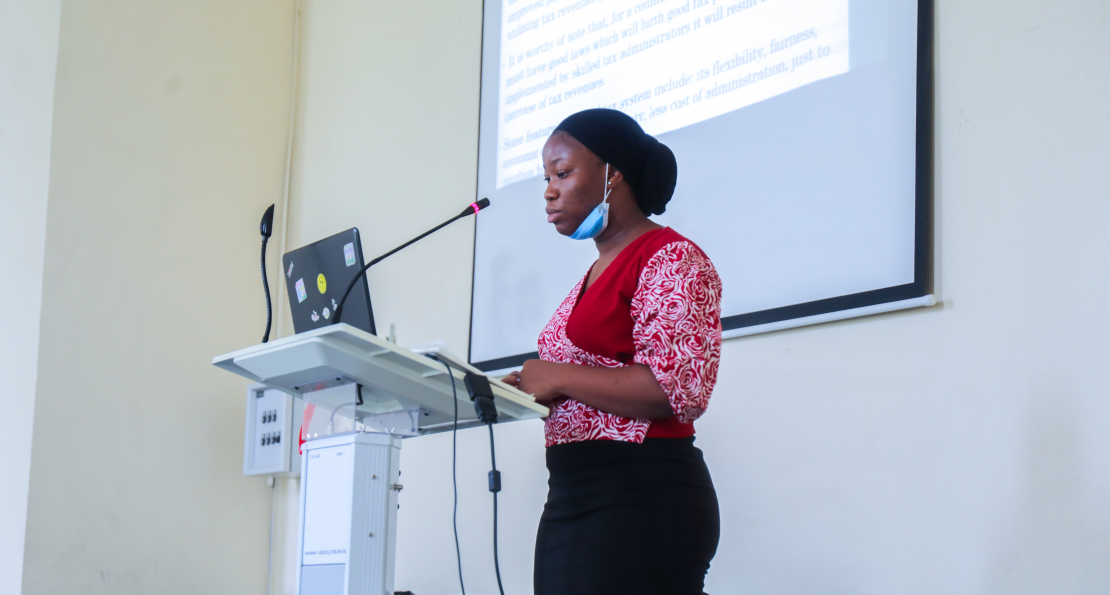From the comfort of your couch, you can buy anything and have it delivered to you. With the ease of online shopping, buyers are happy and foreign companies even happier. But is Nigeria’s government getting a big enough slice of the cake?
A final year student at the American University of Nigeria (AUN), Oluwafunmilayo Bankole believes that the country is not getting as much money from foreign companies providing services in Nigeria online. She presented research on Taxation of Digital Activities: An Evaluation of the Nigerian Approach in a Global Context at the School of Law seminar on Friday 21st May 2021.
In March 2021, revenue from the information and communications sector which accounts for most digital services was pegged at 12.90%. To create a conducive environment for small businesses to thrive, the government exempts companies with less than 25 million Naira yearly turnover from paying the Company Income Tax. Companies that have more than 100 million Naira yearly turnover pay 30% of net earnings in tax. For companies with between 25million and 100 million Naira turnover, they pay 20%.
In February 2020, Nigeria’s Finance Minister Zainab Ahmed signed an amendment to the companies income tax to ensure that companies without a physical presence in Nigeria must still pay taxes. This means that tech companies, social media platforms and other digital companies with significant economic presence (SEP) in Nigeria whether or not they operate a physical office in the country must pay taxes to the Nigerian government.
With declining oil revenue, and the economic hardships brought on by the COVID-19 pandemic, Oluwafunmilayo believes innovative solutions are key. “Nigeria stands to gain a lot from its growing digital economy, but it requires establishment and maintenance of appropriate structure and policy to maximize the potential benefits derivable from its digital economy”. "It is worthy to note that the challenge faced by the digital economy is not only peculiar to Nigeria. However, several countries have taken steps to fix the challenge countries like the United Kingdom and Israel developed laws that have solved this challenge" she said.
In Israel, foreign suppliers are required to register for VAT and pay a standard rate of 18% on net earnings. In the United Kingdom, the government collects a 2% tax on gross revenue from multinationals including online markets, search engines, and social media. Compared to the UK’s 2%, Nigeria’s minimum yearly company gross income tax is 0.25%. However, the Nigerian government’s strategy maybe focused on lower taxes to attract foreign investment into the country.
Oluwafunmilayo proposed effective legislation to address the digital economy taxation. She also believes Nigeria should adopt international best practices. In the educational sector, the country must prioritize digital knowledge skills. She called for a simplified registration process for companies in the digital economy.
“The surge in online business has led to a significant development in digital economies across the world. An effective digital economy presents many benefits for developing countries, especially Nigeria with a large population.” Said Olufunmilayo.
Her research concludes that Nigeria stands to gain a lot more from its growing digital economy, but it requires the establishment and maintenance of appropriate structure and policy to maximize the potential benefits derivable from its digital economy.
Oluwafunmilayo was inspired to research digital taxation following a paper she wrote on the topic for a competition. “The topic of this seminar is very good. It talks about an important issue and a lot needs to be done in the area of digital economy taxation. What Oluwafunmilayo presented is an eye-opener and also the tip of the iceberg. There is room for further research". Said Dr. David Adetoro, Seminar Coordinator at the School of Law.
President of the Law Students Society (LSS), Christine Vihishima commended her classmate’s research. " Digital taxation is a serious problem in Nigeria. There is a need to be intentional about it to increase revenue". She said.
The scholarly community at the American University of Nigeria gathers every Friday at seminars to evaluate and discuss research presented by faculty and students alike. As a development university, research is often focused on real problems in society to proffer solutions and contribute to the body of knowledge.
Reported by Bitwul Dashe


